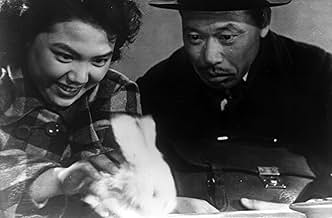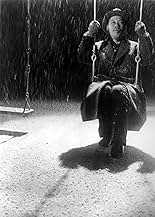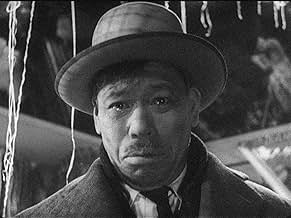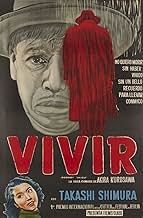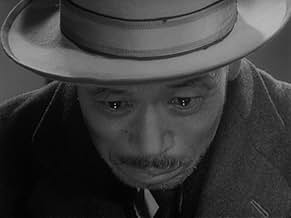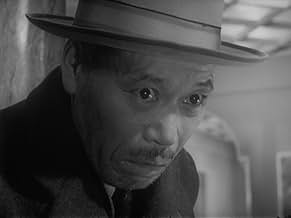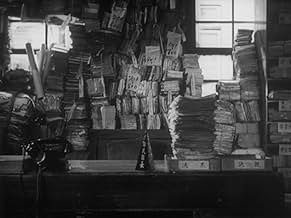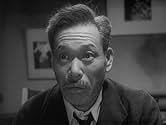Un bureaucrate essaie de trouver un sens à sa vie suite à la découverte qu'il a un cancer en phase terminale.Un bureaucrate essaie de trouver un sens à sa vie suite à la découverte qu'il a un cancer en phase terminale.Un bureaucrate essaie de trouver un sens à sa vie suite à la découverte qu'il a un cancer en phase terminale.
- Réalisation
- Scénario
- Casting principal
- Nomination aux 1 BAFTA Award
- 6 victoires et 2 nominations au total
Avis à la une
Probably one of the most difficult aspects a film like "Ikiru" has to overcome is the very rough march of time. To actually find someone these days, let's say a crowd of regular movie-goers to sit down and watch a film about an old Japanese man dying of cancer would be too much to ask.
Long held shots, hardly uplifting subject, to westerners very foreign. An array of reasons not to see it. And yet, once you actually start getting into the picture it doesn't let you go. Which is why it may be rightfully considered to be a classic.
Of all of Kurosawa's films this is probably the one movie that works perfectly on a universal level. Because at its core it is about one of the most basic desires of human existence...namely to be able to look back on your life and say "It was worth it."
In its starch and unforgiving black-and-white form the movie records the time of one man's life in such a beautiful and yes, colorful way, that by the time the final moments of the film play out, it will be very hard for anybody not to be touched. A glorious moment in 20th century cinema, that will hopefully be preserved for decades to come.
Long held shots, hardly uplifting subject, to westerners very foreign. An array of reasons not to see it. And yet, once you actually start getting into the picture it doesn't let you go. Which is why it may be rightfully considered to be a classic.
Of all of Kurosawa's films this is probably the one movie that works perfectly on a universal level. Because at its core it is about one of the most basic desires of human existence...namely to be able to look back on your life and say "It was worth it."
In its starch and unforgiving black-and-white form the movie records the time of one man's life in such a beautiful and yes, colorful way, that by the time the final moments of the film play out, it will be very hard for anybody not to be touched. A glorious moment in 20th century cinema, that will hopefully be preserved for decades to come.
This film touched me in a way no other film has. Filmed in black and white and gorgeous, both in the visuals and in how the story unfolds. Behold the clever manner of gradually unfolding the story as people jog each other's memories at his funeral (an obligation for them, that gradually turns into a real eulogy). Everything is told in flashbacks: the mourners' memories unfold naturally, as people remember what the man did and struggle to comprehend why.
This film I would nominate for the golden five of the century!
I first saw it in 1956 or so at a small theater in downtown Chicago. A second viewing, years later, confirmed my initial pleasure!
This film I would nominate for the golden five of the century!
I first saw it in 1956 or so at a small theater in downtown Chicago. A second viewing, years later, confirmed my initial pleasure!
10OttoVonB
Ikiru ("to live")is a Kurosawa film devoid of samurai or Toshiro Mifune. It is an oddity in his canon, neither an adaptation, nor an epic, or even a detective story. Instead, it is the simple and touching story of the last months of the life of a man, Watanabbe, public official, who decides to give a meaning to his life by transcending the obtuse and stiff mind of government bureaucracy to get a small public children's park built. As a parable for the soulless workings of modern bureaucracy, the goal is set pretty high, and Kurosawa goes even further, giving this story a lot of character, frequent humor, life and, most of all, heart. And going beyond the strengths of the direction and script, is the central performance by Takashi Shimura (later Kambei in Seven Samurai). Shimura gives his character such a transparently good heart and such great pain that every second of Watanabe's plight and struggle tugs at your heart, not in an overwhelmingly sentimental manner, but in one than feels honest and pure. If even many hardened souls will be drawn to tears, it is not for pity, but, admirably, because of envy for Watanabe's beautiful human dignity in the end, and for a film to have such power is beyond pure accomplishment, as the need to see this and, more importantly, feel it, goes beyond pure necessity...
Kanji Watanabe discovers that he has cancer, and tries to seek some sort of meaning in his final days, he becomes aware that he's operated as a cog in the giant domestic machinery, and fights against the system.
I've been working my way through The Kurosawa films, and thus far I've been impressed with the lot, I'll be honest, I expected a Samurai film, and when it became apparent that that wasn't the case either, I thought it may have been a mystery, it wasn't that either, instead it turned out to be a rather intimate, absorbing character study.
It shows that despite being essentially part of a machine, Kanji has a very human side, only he realises it too late.
This film moved me to tears on occasion, it had me laughing, it certainly had be captivated for the whole running time. That moment where Kanji explains what's happening to his son, it was phenomenal.
I am learning more about Kurosawa with each film I watch, but I must admit, this one threw me totally off guard, it wasn't what I was expecting, it further enhances my realisation that Kurosawa was a genius.
Remember all work and no play! There's a really meaningful message in this film.
9/10.
I've been working my way through The Kurosawa films, and thus far I've been impressed with the lot, I'll be honest, I expected a Samurai film, and when it became apparent that that wasn't the case either, I thought it may have been a mystery, it wasn't that either, instead it turned out to be a rather intimate, absorbing character study.
It shows that despite being essentially part of a machine, Kanji has a very human side, only he realises it too late.
This film moved me to tears on occasion, it had me laughing, it certainly had be captivated for the whole running time. That moment where Kanji explains what's happening to his son, it was phenomenal.
I am learning more about Kurosawa with each film I watch, but I must admit, this one threw me totally off guard, it wasn't what I was expecting, it further enhances my realisation that Kurosawa was a genius.
Remember all work and no play! There's a really meaningful message in this film.
9/10.
I can safely say that I have seen no finer film than Kurosawa's true masterpiece, Ikiru. The story of a dying petty bureaucrat in 1950's Japan, Ikiru is as uncompromisingly honest and beautiful a film as has ever been made on the subject of life. Kurosawa elevates a story that could have been simple melodrama to the level of masterwork with a genuine love of his characters, and with an incredible technical direction. The film's structure accentuates and deepens its many, many lessons on life, and the performances, including a heartbreakingly earnest turn by Shimura are all flawless.
In short, Ikiru is easily one of the greatest works committed to film, and no discerning film aficionado should avoid experiencing it. Had Kurosawa directed only this film, it would still be enough to include him in the pantheon of the greatest storytellers who ever lived. Fortunately for us, it is simply the pinnacle of a staggeringly amazing career. It is the absolute definition of a 10/10 film.
In short, Ikiru is easily one of the greatest works committed to film, and no discerning film aficionado should avoid experiencing it. Had Kurosawa directed only this film, it would still be enough to include him in the pantheon of the greatest storytellers who ever lived. Fortunately for us, it is simply the pinnacle of a staggeringly amazing career. It is the absolute definition of a 10/10 film.
Le saviez-vous
- AnecdotesWhen Takashi Shimura rehearsed his singing of "Song of the Gondola," director Akira Kurosawa instructed him to "sing the song as if you are a stranger in a world where nobody believes you exist."
- GaffesWhen Kanji and the Novelist go to a busy, loud nightclub, the film has been reversed as evidenced by the backwards "Nippon Beer" banner in the background.
- ConnexionsFeatured in The Siskel & Ebert 500th Anniversary Special (1989)
- Bandes originalesJ'ai Deux Amours
(uncredited)
Music by Vincent Scotto
Lyrics by Georges Koger and Henri Varna
Performed by Josephine Baker
[Played when entering the bar with the long-faced man]
Meilleurs choix
Connectez-vous pour évaluer et suivre la liste de favoris afin de recevoir des recommandations personnalisées
Détails
Box-office
- Montant brut aux États-Unis et au Canada
- 60 239 $US
- Week-end de sortie aux États-Unis et au Canada
- 2 149 $US
- 29 déc. 2002
- Montant brut mondial
- 114 026 $US
- Durée
- 2h 23min(143 min)
- Couleur
- Mixage
- Rapport de forme
- 1.37 : 1
Contribuer à cette page
Suggérer une modification ou ajouter du contenu manquant

![Regarder Trailer [OV]](https://m.media-amazon.com/images/M/MV5BMTg4OWJkNjMtM2Y0Mi00MzQ5LTk3Y2YtZWMwNGUyOTIyNGVjXkEyXkFqcGdeQXRyYW5zY29kZS13b3JrZmxvdw@@._V1_QL75_UX500_CR0)
